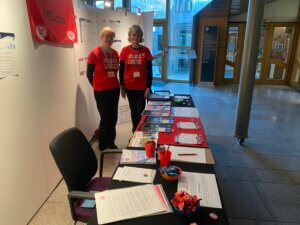The Open Medicine Foundation (OMF) writes about their plan to move forward with an ME/CFS Collaborative Research Center at Stanford University with the $1.2 million that has been raised from the patient community. The National Institutes of Health had declined to fund OMF’s research so the non-profit is moving forward with the research thanks to its private fundraising efforts.
Dear Friends,
We are proud to announce funding for the ME/CFS Collaborative Research Center at Stanford University led by Ronald W. Davis, PhD, Director of our Scientific Advisory Board.
Dr. Davis has assembled a world-class team of scientists, many of whom have never before focused their expertise on ME/CFS, and has planned several innovative projects that will help us to understand the molecular basis of ME/CFS, develop better diagnostics, and discover new treatments. Given the number and quality of investigators that this grant would bring into the field, and the likelihood of groundbreaking discoveries coming from this research, OMF has decided to fund this highly promising proposal.
Although the National Institutes of Health decided against funding this plan as one of their Collaborative Research Centers, we believe this work is too important and too promising not to pursue. The opportunity to bring a scientific team of this caliber into the field of ME/CFS research is not one we are willing to miss, and we have heard from many of you who agree! That’s why we are funding the first year of this vital work with a $1.2 million grant that we have raised from our generous patient community.
We need your support for this amazing team to continue beyond year 1 to complete these projects. One year of funding is enough to make significant progress, but these ambitious projects will require multiple years to complete and publish. To support and maintain this groundbreaking research, please donate today.
The ME/CFS Collaborative Research Center at Stanford will work on three projects that are critical and fundamental to understanding this disease and developing diagnostics and treatments:
- T cells and the molecular immunology of ME/CFS
Sequencing single T cells and discovering their targets
- Extended big data study in families
Genome sequencing, gene expression, metabolomics, cytokines, clinical features, and more
- Developing blood-based diagnostic and drug screening technology
Enabling fast, inexpensive diagnosis of ME/CFS and discovery of new treatments
To learn more about the scientific plan for these projects and the outstanding team that makes up the Collaborative Research Center, please visit our webpage.
The scientific team includes:
Ron Davis, PhD, Professor of Biochemistry and Genetics, Stanford University School of Medicine; Director, Stanford Genome Technology Center; Director, Chronic Fatigue Syndrome Collaborative Research Center at Stanford University; Director, Open Medicine Foundation ME/CFS Scientific Advisory Board.
Mark M. Davis, PhD, Director, Stanford Institute for Immunology, Transplantation and Infection (ITI); Professor of Microbiology and Immunology; Howard Hughes Medical Institute Investigator.
Mike Snyder, PhD, Chair, Stanford Department of Genetics; Director, Stanford Center for Genomics and Personalized Medicine
Wenzhong Xiao, PhD, Director, Immuno‐Metabolic Computational Center, Massachusetts General Hospital, Harvard Medical School.
Craig Heller, PhD, Professor of Biology, Stanford University, exercise physiologist.
Robert Phair, PhD, Chief Science Officer, Integrative Bioinformatics, Inc..
Lars Steinmetz, PhD, Co-Director, Stanford Genome Technology Center; Professor of Genetics, Stanford University; Senior Scientist, Genome Biology Unit, European Molecular Biology Laboratory.
Raeka Aiyar, PhD, Director of Communications and Development, Stanford Genome Technology Center.
Laurel Crosby, PhD, Engineering Research Associate, Stanford Genome Technology Center – multi-system integration
Rahim Esfandyarpour, PhD, Engineering Research Associate, Stanford Genome Technology Center – electrical engineering, device fabrication
Fereshteh Jahaniani, PhD, Research Associate, Stanford Center for Genomics and Personalized Medicine – multi-omics
Mohsen Nemat-Gorgani, PhD, Life Science Research Scientist, Stanford Genome Technology Center – protein biochemistry, enzymology
Peidong Shen, PhD, Research Associate, Stanford Genome Technology Center – biochemistry, cell-free DNA detection methods
Gozde Durmus, PhD, Postdoctoral Fellow, Stanford Genome Technology Center – magnetic levitation platform, bioengineering
Julie Wilhelmy, Life Science Research Professional, Stanford Genome Technology Center – experimental genomics, immunology
Robert Naviaux, MD, PhD, Professor of Medicine, Pediatrics, and Pathology, University of California, San Diego; Co-Director of Mitochondrial and Metabolic Disease Center
William Robinson, MD, Associate Professor of Medicine (Immunology and Rheumatology), Stanford University
Curt Scharfe, MD, Associate Professor of Genetics, Yale University
Lucinda Bateman, MD, founder and Medical Director of the Bateman-Horne Center for ME/CFS and Fibromyalgia
David Kaufman, MD, ME/CFS Physician
We are fortunate that many members of the scientific, medical, and biotechnology communities have offered their expertise and resources to this Center. This Working Group includes:
Paul Berg, PhD, Professor of Biochemistry, Emeritus, Stanford University; Nobel Laureate
Mario Capecchi, PhD, Professor of Human Genetics and Biology, University of Utah; Nobel Laureate.
Baldomero Olivera, PhD, Professor of Biology, University of Utah
Alain Moreau, PhD, Professor of Biochemistry and Molecular Medicine, University of Montreal
Øystein Fluge, MD, Department of Oncology and Medical Physics, University of Bergen, Haukeland University Hospital, Bergen, Norway
Olav Mella, MD, Department of Oncology and Medical Physics, University of Bergen, Haukeland University Hospital, Bergen, Norway
Jonas Bergquist, MD, PhD, Professor of Analytical Chemistry and Neurochemistry, Uppsala University
Jonas Blomberg, MD, PhD, Professor of Clinical Virology, Emeritus, Uppsala University
Maureen Hanson, PhD, Professor of Molecular Biology and Genetics, Cornell University
Chris Armstrong, PhD, Department of Biochemistry and Molecular Biology; Bio21 Molecular Science & Biotechnology Institute researcher at the University of Melbourne, Melbourne, Australia
Neil McGregor, BDS, MDSc, PhD, senior researcher, Bio21 Molecular Science and Biotechnology Institute, University of Melbourne, Melbourne, Australia; Adjunct Professor, Victoria University, Melbourne, Australia
Ronald Tompkins, MD, ScD, Professor of Surgery, Harvard Medical School; Founding Director of Center for Surgery, Science & Bioengineering at Massachusetts General Hospital
Catherine Blish, MD, PhD, Assistant Professor of Medicine and of Immunology, Stanford University
Christopher Garcia, PhD, Professor of Molecular and Cellular Physiology, Stanford University
Roger Howe, PhD, Professor of Engineering, Stanford University; Director, Stanford Nanofabrication Facility
Tom Soh, PhD, Professor of Electrical Engineering, Radiology, and by courtesy, Chemical Engineering, Stanford University
Robert Tibshirani, PhD, Professor of Biomedical Data Sciences and Statistics, Stanford University
Alan Light, PhD, Professor of Anesthesiology, University of Utah
Emmanuel Mignot, MD, PhD, Professor of Sleep Medicine and of Psychiatry and Behavioral Sciences, Stanford University; Director of Stanford Center for Sleep Sciences and Medicine
Gerald Shadel, PhD, Professor of Pathology and Genetics, Yale University; Director of Yale Center for Research on Aging
Jarred Younger, PhD, Associate Professor of Anesthesiology and Rheumatology and of Psychology, University of Alabama at Birmingham; Director, Neuroinflammation, Pain, and Fatigue Laboratory
John Ryals, PhD, President and CEO, Metabolon
Chunlin Wang, PhD, Chief Technology Officer, iRepertoire, Inc.
Michael Mindrinos, PhD, President of Sirona Genomics, an Immucor company
David Bell, MD, ME/CFS Physician
Kevin Tracey, MD, Professor of Neurosurgery and Molecular Medicine, Hofstra Northwell School of Medicine
Jennifer Frankovich, MD, Clinical Associate Professor of Pediatric Rheumatology, Stanford University
Jose Montoya, MD, Professor of Medicine, Stanford University; ME/CFS Physician
Susan Levine, MD, ME/CFS Physician
Harry Greenberg, MD, Senior Associate Dean of Research, Professor of Medicine, Stanford University
Bela Chheda, MD, ME/CFS Physician
We are so grateful to the donors whose support has made it possible to establish this Center! Please stay tuned for updates on the progress of this innovative work.
With hope for all,

Linda Tannenbaum
CEO/President
www.omf.ngo





